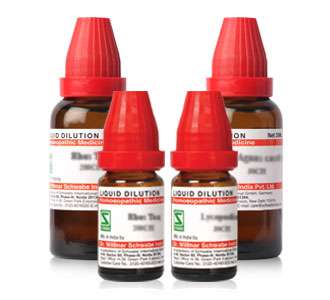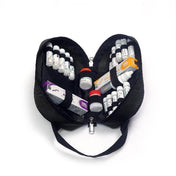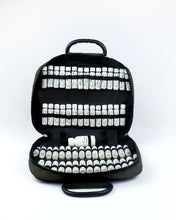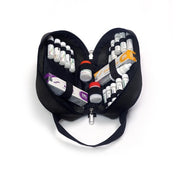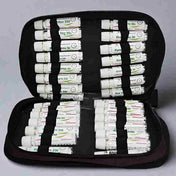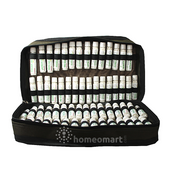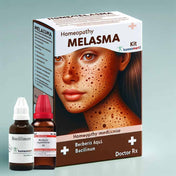Lonicera Xylosteum Homeopathy Mother Tincture Q
Lonicera Xylosteum Homeopathy Mother Tincture Q - 30ml is backordered and will ship as soon as it is back in stock.
Couldn't load pickup availability
Description
Description
About Lonicera Xylosteum Homeopathy Mother Tincture
Lonicera xylosteum, commonly known as Fly Honeysuckle or Dwarf Honeysuckle, is a plant that is sometimes used in homeopathic medicine. Homeopathic remedies are prepared from natural substances and are used in highly diluted forms to treat various health conditions. Here's some information about Lonicera xylosteum in homeopathy:
Common Names:
- Lonicera xylosteum (Homeopathic Name)
- Fly Honeysuckle or Dwarf Honeysuckle (Botanical Names)
Clinical Indications and Health Benefits:
In homeopathy, Lonicera xylosteum is not one of the more commonly used remedies, and its use is relatively limited. It may be indicated for a range of conditions, but clinical evidence and widespread usage are not well-documented. Some of the potential clinical indications and health benefits may include:
- Respiratory Conditions: Lonicera xylosteum may be considered for respiratory complaints, such as coughs, colds, and bronchitis. It is sometimes used when there is a sensation of constriction or tightness in the chest.
- Urinary Issues: It might be used for urinary symptoms, but specific indications and benefits are not extensively described in homeopathic literature.
- Skin Conditions: In some cases, Lonicera xylosteum may be used for skin problems, although its use in this context is not widespread.
Materia Medica Information:
- Lonicera xylosteum is not one of the more extensively documented remedies in homeopathic materia medica.
- Its clinical indications and specific symptom profiles are not as well-defined as some other remedies.
Side Effects:
In homeopathic practice, remedies are highly diluted, which means that they contain minimal amounts of the original substance. As a result, they are generally considered safe and non-toxic, with very few, if any, side effects.
However, it's important to remember that homeopathic remedies should be chosen based on an individual's specific symptoms and constitution. The selection of the appropriate remedy and its potency should be determined by a qualified homeopathic practitioner.
Preparation: Mother Tinctures like Lonicera Xylosteum are the starting point for dilutions. Authenticity of the raw materials, age, collection, cleaning and drying methods, basic percentage of active ingredients, the quality of alcohol and water, and the percentage used, method used (Percolation or Maceration), the strength of phytochemicals, filteration, bacterial counts are some of the important factors responsible for good quality mother tinctures. These are meticulously followed, and the distilled and filtered mother tinctures are stored in rooms fitted with expensive explosion resistant and flame-proof electrical fittings of proper intensities to avoid any accident and protect the phytochemicals content in the tinctures.
Helpful in cases of convulsions. Sediments in urine.
Head: Head feels congested along with a feeling of congestion in the chest.
Lonicera Xylosteum Homeopathy therapeutic range of actions as per Boericke Materia Medica
Fly-woodbine
Convulsive symptoms. Uraemic convulsions. Albuminuria. Syphilis.
Head.--Congestion of head and chest; coma. Contraction of one pupil and dilatation of the other. Sopor, eyes half open red face.
Extremities.--Jerking of limbs. Trembling of whole body. Violent convulsions. Limbs and head fall over as if paralyzed. Extremities cold. Cold perspiration.
Relationship.--Compare: Lonicera pericylmenum-Honeysuckle --(irritability of temper, with violent outburst (Crocus)).
Eyes: One pupil appears contracted and the other dilated. Eyes are half open with a red face. Very sleepy, cannot keep eyes open.
Extremities: Jerking of limbs. Trembling of the entire body. Convulsions of a violent nature. Limbs and head feel too weak. Extremities feel too cold. Cold sweat.
Dosage: Please note that the dosage of single homoeopathic medicines varies from drug to drug depending upon the condition, age, sensitivity and other things. In some cases they are given as regular doses as 3-5 drops 2-3 times a day whereas in other cases they are given only once in a week, month or even in a longer period. We strongly recommend that the medication should be taken as per the physician's advice.
Please avoid taking any food or drinks for a few minutes before and after taking the medication.
Side Effects:
No side effect of this remedy is known in therapeutic doses.
Contraindications:
No contraindication for the use of this remedy is known.
Dose.--Third to sixth potency.

